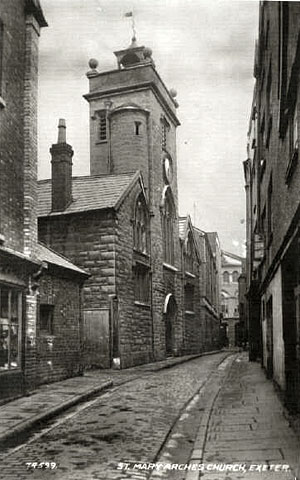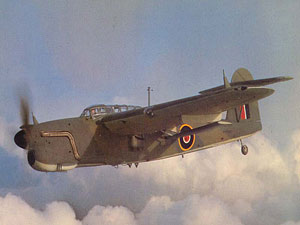
Exeter Stories
Exeter folk and friends in their own words - │ << Previous story │ Next story >> │
Memories of Terry Mudge - from Exwick to the Tirpitz
I was born in a maternity home in Dixs Field in 1928, my father William Mudge and his sister Alice lived with his father, also William, at 51, Mary Arches Street.
My father was called up to the Somerset Light Infantry in the First World war and saw service in the Trenches of Flanders, later he was sent to Mesopotamia (Iraq) where he learnt to drive motor vehicles. When demobbed he found a job as a driver, in a recently established bed and mattress factory called Tomms who had premises on the corner of Synagogue Place, in Mary Arches Street, the company had just moved down from High Wycombe and brought some of their staff including my mother Daisy Welch. A romance developed and father married Daisy, at first they lived at 51 Mary Arches Street but when I came along they moved to Rack Street.
My Aunt Alice married Len Born and they lived at 12, Mary Arches Street, which is roughly where the Rococo Night Club now is.
The move to Siberia
The cottage we had in Rack Street was condemned like much of the property in the West Quarter, my parents were the first tenants in the newly constructed council house at Briar Crescent on the Burnt House Lane estate, which is where I grew up, attending the new Bradley Rowe School until I was 10 years old, when my mother died.I was taken by relatives to live with them in Worcester so that my father could get things sorted out, but the Second World war intervened. Dad was concerned that where I was living in the Midlands was more likely to be a target for German bombs, so he brought me back aged 12, to live with my Gran in Mary Arches Street, which became one of the most heavily bombed bits of Exeter.
I was then attending St Lukes College, which was a secondary school in Heavitree Road attached to the teacher training college.At that time Mary Arches Street was the narrow street shown in the photograph, for its entire length up from Bartholomew Street. After the blitz the road was as it is today between Synagogue Place and Fore Street, but the lower part of the street was narrow well into the 1960s. We lived two doors from the Church, beside the Vestry. My uncle Len Born had started his motor cycle business on the opposite side of the street and he used to rent the Vestry to store new machines and other equipment. I recall there was a large brick and concrete communal Air Raid Shelter opposite the end of Synagogue place, but I don't know if it was built there before or after the bombing raid of 1942.
Save the motorcycles
On the night of 3/4th. May, 1942, which was one of the biggest bombing raids on Exeter, I was sleeping in the space beneath the stairs at Gran's house when the bombing started, I recall being roused by Uncle Len to help shift the motor bikes from the Vestry to Bartholomew Street because they were threatened by fire, I was amazed to see what had happened when I opened the front door. When I went to bed I was living in a narrow cramped street, when I woke up it was wide open spaces, albeit a bit of debris about! After this raid, we started to leave the city every night to avoid the bombings. I remember we went to Dunsford Hill where there were some underground caves, they were probably where Exonia Caravan Park now is, I remember that there used to be a lot of people sheltering there, and sleeping overnight. Later Uncle Len had a wooden chalet out near Dunsford. When he finished work the family would load up with overnight gear and food, and go out to Dunsford where we thought we would be safe from the bombing.
Munitions work sinks the Tirpitz
I left school in 1943 and went to work in the aircraft factory of Delaney & Galley at Exwick (later the Hill, Palmer & Edwards Bakery) where we made parts for aeroplanes, I remember we were producing for the Fairey 'Barracuda', a torpedo bomber used by the Fleet Air Arm (which was the plane used to attack the German battleship 'Tirpitz' and prevent it being used in the war).
In 1947 I was conscripted into the R A F where my knowledge of aircraft production came useful, I was posted to Egypt where the R A F had quite a big set up, I was only doing National Service of 18 months but just as I was to be demobbed the Berlin Airlift started. Our Squadron was posted back to England The R A F were much involved using heavy bombers, Lancaster's and Halifax's, in fact anything that could carry a load into Berlin.
The journey back to England was not without incident. In the rush to get planes and men to keep the airlift going, the planes with their air and ground crews were flown home together, the 'erks' riding in the bomb bay. Because these bombers were not pressurised, we had to fly at low altitude, this meant, we came via Marseilles, where we stopped overnight. On our overnight stop, we went to the Pictures on the base, the cinema caught fire, and one of my mates lost his life.
We eventually arrived at RAF Burbrook in Lincolnshire, which was one of the bases in use for the Berlin Airlift. We were working round the clock to maintain the aircraft. My demob was put on hold and I had to do an extra year in the RAF.
Back to Exeter
On my return to Exeter my old employers had gone, so I found a job at Taylor's Optical Works at Pinhoe. The National Health Service had started and everybody was taking advantage of the free glasses available on prescription. I had been there a few weeks when the Government brought in a charge for National Health glasses. Either, peoples eyesight improved and they did not need glasses, or they would not pay for them, the end result was the same. Production stopped overnight, we were left with all the glasses we had produced. The company laid us off, I was out of work and prepared to take on anything.
I found a job at the Princess Elizabeth Orthopaedic Hospital, I was doing menial jobs around the place, when they asked me to train as an Operating Theatre Assistant. I took the job on as a stop gap measure and stayed there for 22 years assisting in every type of orthopaedic surgery. The Cold War was very much in being, the Government were in great fear of the Russians, and were recruiting for the reserve forces in case hostilities broke out again. Along with a lot of staff from Princess Elizabeth Hospital, I joined the Royal Army Medical Corps T A unit, and we formed the mobile field hospital that was based at Butts Road, Heavitree, where we trained in case of emergency, and went annually on exercise with the Regular Army. In between times we went to Military Hospitals in Cambridge and Aldershot to replace the Regular personnel.
About 1970 the consultant anaesthetist at the Princess Elizabeth Orthopaedic Hospital told me that they were looking for a man with my particular skills, to be involved with the ambulance transport of patients, particularly children, between hospitals when en route treatment, or connection to special equipment was required. This was about the time that the Ambulance Service started to change, until then it was a very basic transport service which took people to and fro hospitals. The only qualifications required were a driving licence and a First Aid Certificate. I thought a change was due, so I joined the Ambulance Service where I worked for another 22 years, and saw the transformation from a transport facility to a very professional team of first response medics.
Terry Mudge is a retired paramedic.
 Terry lived almost next to St Mary
Arches Church.
Terry lived almost next to St Mary
Arches Church. Parts for the Barracuda Bomber were
manufactured in Exwick.
Parts for the Barracuda Bomber were
manufactured in Exwick.
│ Top of Page │